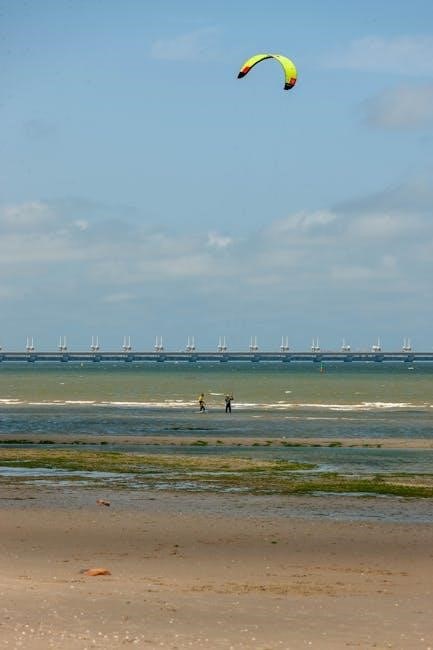Historical Context of “Inherit the Wind”
The play is a fictionalized account of the 1925 Scopes Monkey Trial, exploring the clash between science and religion in a small Tennessee town.

1.1 The Scopes Monkey Trial and Its Significance
The Scopes Monkey Trial of 1925 was a landmark legal case in Dayton, Tennessee, where high school teacher John Scopes was prosecuted for teaching evolution. The trial became a national sensation, symbolizing the clash between religious fundamentalism and scientific progress. It highlighted the tension between traditional values and modern ideas, drawing widespread media attention. The trial’s significance lies in its exploration of censorship, intellectual freedom, and the role of religion in education, themes that directly inspired Jerome Lawrence and Robert E. Lee to write Inherit the Wind. The play fictionalizes the trial, using it as a backdrop to explore deeper societal conflicts.
1.2 Jerome Lawrence and Robert E. Lee: The Playwrights
Jerome Lawrence and Robert E. Lee were renowned American playwrights known for their collaborative works. Inspired by the Scopes Monkey Trial, they co-authored Inherit the Wind, which premiered in 1955. Lawrence and Lee’s partnership began in the 1940s, focusing on socially relevant themes. Their play not only dramatizes the trial but also explores broader issues like freedom of thought and societal intolerance. Through their work, they aimed to provoke reflection on the ongoing debates between science and religion, ensuring the play’s timeless relevance.

Main Characters in the Play
Bertram Cates, a teacher, challenges evolution laws, while Matthew Brady defends religious beliefs. Rachel Brown bridges them emotionally, highlighting the clash between science and tradition.

2.1 Bertram Cates: The Defendant and His Determination

Bertram Cates, a schoolteacher, is the defendant in the trial, charged for teaching evolution. His determination to stand by scientific truth drives the play’s central conflict. Cates’ belief in intellectual freedom and his refusal to back down despite societal pressure highlight his courageous character. His actions spark a broader debate about education and individual rights, making him a symbol of resistance against oppressive norms; Through his journey, the play underscores the importance of conviction and the fight for progressive ideas in a conservative community.
2.2 Matthew Harrison Brady: The Prosecutor and His Beliefs
Matthew Harrison Brady is the prosecutor in the trial, a charismatic and deeply religious man who believes in upholding traditional values. He sees the case as a moral crusade, defending biblical teachings against scientific theories. Brady’s unwavering faith and courtroom prowess make him a formidable figure. However, his rigid beliefs and overconfidence lead to his downfall, as he struggles to adapt to the changing world. Brady’s character represents the tension between religion and progress, highlighting the challenges of clinging to dogma in the face of evolving ideas.

Themes and Symbolism
The play explores themes of freedom of thought and the clash between religion and science, symbolizing the broader societal conflicts of the early 20th century.

3.1 The Theme of Freedom of Thought
The theme of freedom of thought is central to Inherit the Wind, as it highlights the conflict between rigid religious beliefs and the evolving understanding of science. The trial of Bertram Cates, who challenges the town’s strict laws against teaching evolution, serves as a catalyst for this exploration. Through his defiance, the play underscores the importance of intellectual freedom and the right to question established doctrines. This theme remains universally relevant, encouraging audiences to reflect on the ongoing tensions between tradition and progress in society.
3.2 The Symbolism of the Small Town in the Play
The small town in Inherit the Wind serves as a powerful symbol of societal tensions and cultural isolations. Its close-knit, conservative community represents a microcosm of America’s broader struggles with progress and tradition. The town’s dwindling economy and desire for attention underscore its vulnerability to external influences. Through its rigid beliefs and hostility toward change, the town embodies the fear of intellectual and scientific advancements. The courtroom becomes a battleground for these ideologies, while the townspeople’s reactions mirror the larger societal conflict between faith and reason, making the town a timeless symbol of human resistance to change.

The Trial and Its Impact
The trial in Inherit the Wind mirrors the real-life Scopes Monkey Trial, highlighting the clash between science and religion. Its impact sparked debates on freedom of thought and intellectual freedom, reflecting societal tensions and the legal battle’s broader implications.
4.1 The Legal Battle and Its Reflection in the Play
The legal battle in Inherit the Wind dramatizes the Scopes Monkey Trial, where Bertram Cates faced prosecution for teaching evolution. The play captures the intense courtroom debates, highlighting the tension between scientific theory and religious doctrine. Through this fictionalized account, the playwrights explore themes of intellectual freedom and societal conflict. The trial’s reflection in the play underscores the broader struggle between tradition and progress, resonating with audiences long after the original trial’s conclusion. The legal proceedings serve as a metaphor for the enduring clash of ideas in American society.
4.2 The Real-Life Inspiration: The Scopes Trial of 1925
The Scopes Trial of 1925 was a landmark legal case that inspired Inherit the Wind. John Scopes, a high school teacher, was prosecuted for teaching evolution in Tennessee, violating the Butler Act. The trial became a national sensation, pitting Clarence Darrow, defending Scopes, against William Jennings Bryan, prosecuting; The play fictionalizes this event, capturing the tension between science and religion. While Scopes was fined, the trial sparked a broader debate on intellectual freedom. The play reflects this historical clash, emphasizing the enduring relevance of the issues explored in the trial.
Availability of “Inherit the Wind” in PDF Format
Inherit the Wind is widely available in PDF format through various online sources, including Amazon, Google Books, and educational platforms like Internet Archive.
- Amazon offers digital versions for Kindle.
- Google Books provides preview and purchase options.
- Internet Archive offers free access to the play.
Some platforms may require payment or subscription for full access.

5.1 Sources for Downloading the Play in PDF
Inherit the Wind can be downloaded in PDF format from various online sources, including Amazon, Google Books, and educational platforms like Internet Archive.
- Amazon offers digital versions of the play for Kindle devices.
- Google Books provides preview and purchase options for the PDF.
- Internet Archive offers free access to the play in PDF format.
- Study guides and companion materials are also available on platforms like EverPDF and StudyGuide.org.
Ensure to verify the legality and quality of the source before downloading.
5.2 Study Guides and Companion Materials
Comprehensive study guides and companion materials for Inherit the Wind are available to enhance understanding of the play.
- SparkNotes and CliffsNotes provide detailed summaries, character analysis, and theme explanations.
- PDFDrive and EverPDF offer downloadable guides with critical essays and discussion questions.
- These resources are ideal for students and educators, offering insights into the play’s historical context and literary significance.
- Additional materials include lesson plans and activity ideas for classroom use.
These tools are invaluable for deeper analysis and engagement with the play’s themes and characters.
Legacy of the Play
Inherit the Wind remains a durable piece of American theater, with productions like those by Asolo Rep showcasing its enduring relevance and impact since its 1955 premiere.
6.1 Adaptations and Stage Productions
Inherit the Wind has seen numerous stage adaptations, including notable productions by Asolo Rep and The Cardinal Stage Company. These productions highlight the play’s timeless themes, drawing audiences into its exploration of freedom of thought and societal conflict. The play’s universal appeal continues to attract directors and actors, ensuring its relevance across generations. Its adaptation into various stage formats underscores its enduring power to provoke thought and reflection. The legacy of Inherit the Wind is cemented through its continued presence in theaters worldwide, offering fresh interpretations of its historical and philosophical themes.
6.2 Relevance of the Play in Modern Times
Inherit the Wind remains profoundly relevant today, as its themes of freedom of thought, scientific inquiry, and societal conflict continue to resonate. The play’s exploration of tensions between tradition and progress mirrors modern debates over science education and intellectual freedom. Its portrayal of a divided community echoes contemporary polarization, making it a powerful lens for understanding current societal challenges. The play’s universal themes ensure its continued relevance, inviting audiences to reflect on the importance of critical thinking and open-mindedness in addressing modern issues.
